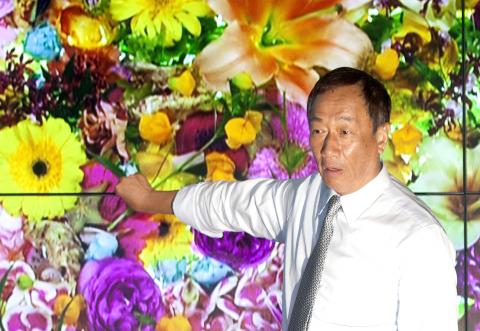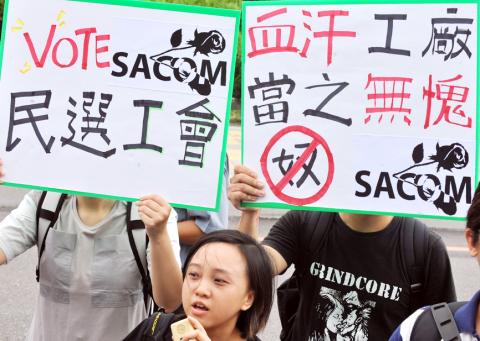Hon Hai Precision Industry Co Ltd (鴻海精密), which assembles iPads and iPhones for Apple Inc, yesterday said it was in talks with Sharp Corp to boost its stake in the Japanese firm to secure advanced technologies for manufacturing high-definition and ultrathin screens.
The collaboration would “beat Samsung,” Hon Hai chairman Terry Gou (郭台銘) told an annual shareholders’ meeting yesterday.
“Sharp’s share price has fallen from [Hon Hai’s] purchasing price of ¥550 to about ¥400 today because of an unfavorable macroeconomy,” Gou said. “We are in talks with representatives sent by the company. We hope to have a chance to invest more.”

Photo: Reuters
On March 27, Hon Hai said it planned to acquire a 9.87 percent share of Sharp through its overseas investment arms and local subsidiary Foxconn Technology Co (鴻準), a computer casings and connectors maker, for about ¥66.91 billion (US$846.5 billion).
Sharp, one of Apple Inc’s major display suppliers for its iPhones, makes high-resolution OLED displays for mobile devices at its sixth-generation plants and also operates an 8.5-generation fab, Gou said.
With the help of Sharp, Hon Hai would gain access to advanced in-cell technology to make touch panels, he said.

Photo: Mandy Cheng, AFP
Market speculation is that Apple would use in-cell touch screens for its new iPhone.
However, Hon Hai faces opposition from Sharp and Japan in selling more shares to Hon Hai, Gou said.
He declined to disclose how many shares his company intended to buy more from Sharp.
Gou said the company did not seek to change the terms reached with Sharp to acquire the stake because of the Japanese company’s lower share price.
Separately, Gou said he had also invested in Sharp’s 10th-generation LCD plant in Sakai, operated by a spin-off of Sharp, Sakai International Corp. He bought a 50 percent stake in the company for ¥66 billion; Sharp holds the other half.
Sakai International plans to trade its shares on the local stock market within the next three years to fund capacity expansion, Gou said.
“Soon, our capacities will not be sufficient. We need to raise funds for expansion,” Gou said.
Sharp’s 10G plant processes glass substrates with optimal cuts of 60-inch, 70-inch, or 80-inch LCD screens.
The new products from the 10G plant are expected to hit the local market in fall, he said.
Gou told investors he was confident that Hon Hai would achieve its revenue growth target of 15 percent this year.
“I’m confident about Hon Hai’s outlook, no matter how bad the global economy might be. We are well prepared [to benefit from new technologies,” Gou said.
Hon Hai is one of the very few companies in the world that are able to make full-line products running on either Apple’s iOS, Google Inc’s Android, or Microsoft Corp’s Windows 8, he said.
Last year, Hon Hai’s consolidated revenue expanded 15.2 percent to NT$3.45 trillion (US$115.4 billion) last year, from NT$3 trillion in 2010, according to the company’s financial statement.
Hon Hai shareholders yesterday gave the green light to its proposal to distribute a cash dividend of NT$1.50 per share and a stock dividend of 10 percent based on last year’s net profit of NT$81.59 billion, or NT$7.65 per share.
Shareholders also approved a rights issue for the firm to sell as many as 1 billion common shares in the form of global depositary receipts to fund its capacity expansion and other plans.

UNCERTAINTY: Innolux activated a stringent supply chain management mechanism, as it did during the COVID-19 pandemic, to ensure optimal inventory levels for customers Flat-panel display makers AUO Corp (友達) and Innolux Corp (群創) yesterday said that about 12 to 20 percent of their display business is at risk of potential US tariffs and that they would relocate production or shipment destinations to mitigate the levies’ effects. US tariffs would have a direct impact of US$200 million on AUO’s revenue, company chairman Paul Peng (彭雙浪) told reporters on the sidelines of the Touch Taiwan trade show in Taipei yesterday. That would make up about 12 percent of the company’s overall revenue. To cope with the tariff uncertainty, AUO plans to allocate its production to manufacturing facilities in

TAKING STOCK: A Taiwanese cookware firm in Vietnam urged customers to assess inventory or place orders early so shipments can reach the US while tariffs are paused Taiwanese businesses in Vietnam are exploring alternatives after the White House imposed a 46 percent import duty on Vietnamese goods, following US President Donald Trump’s announcement of “reciprocal” tariffs on the US’ trading partners. Lo Shih-liang (羅世良), chairman of Brico Industry Co (裕茂工業), a Taiwanese company that manufactures cast iron cookware and stove components in Vietnam, said that more than 40 percent of his business was tied to the US market, describing the constant US policy shifts as an emotional roller coaster. “I work during the day and stay up all night watching the news. I’ve been following US news until 3am

COLLABORATION: Given Taiwan’s key position in global supply chains, the US firm is discussing strategies with local partners and clients to deal with global uncertainties Advanced Micro Devices Inc (AMD) yesterday said it is meeting with local ecosystem partners, including Taiwan Semiconductor Manufacturing Co (TSMC, 台積電), to discuss strategies, including long-term manufacturing, to navigate uncertainties such as US tariffs, as Taiwan occupies an important position in global supply chains. AMD chief executive officer Lisa Su (蘇姿丰) told reporters that Taiwan is an important part of the chip designer’s ecosystem and she is discussing with partners and customers in Taiwan to forge strong collaborations on different areas during this critical period. AMD has just become the first artificial-intelligence (AI) server chip customer of TSMC to utilize its advanced

Six years ago, LVMH’s billionaire CEO Bernard Arnault and US President Donald Trump cut the blue ribbon on a factory in rural Texas that would make designer handbags for Louis Vuitton, one of the world’s best-known luxury brands. However, since the high-profile opening, the factory has faced a host of problems limiting production, 11 former Louis Vuitton employees said. The site has consistently ranked among the worst-performing for Louis Vuitton globally, “significantly” underperforming other facilities, said three former Louis Vuitton workers and a senior industry source, who cited internal rankings shared with staff. The plant’s problems — which have not